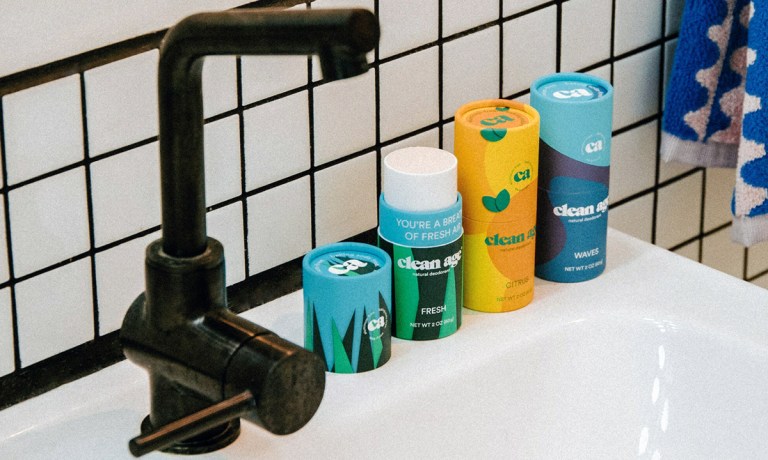Is D2C a Tired Playbook? How One Beauty Brand Finds Value in Retail Distribution

In the past few years, grocery stores have significantly transformed, expanding beyond their traditional role as food suppliers. They have evolved into comprehensive shopping destinations, offering many products, including beauty and health items. This transformation has ushered in an era of unparalleled convenience for consumers, allowing them to conveniently shop for a diverse selection of personal care and wellness products alongside their groceries.
The decision to expand its product range stems from the observation that shoppers frequently visit grocery stores. By offering a diverse range of products, consumers can purchase their weekly groceries and explore a variety of personal care items, including skincare, haircare products and over-the-counter medications, all in one convenient shopping trip.
But not all grocery stores are alike.
In an interview with PYMNTS, Rachel Peters, the CEO and founder of Clean Age, a consumer-packaged goods (CPG) company specializing in personal care products for Gen Z, such as deodorant and toothpaste tabs, delves into the advantages of catering to more niche grocery stores while also acknowledging the significant opportunities presented by big box retailers like Walmart.
“Our initial retailer was Fred Meyer in the Pacific Northwest — a Kroger banner. The reason this partnership was truly remarkable for us is that a significant majority of natural products within the entire Kroger ecosystem were being sold at Fred Meyer, by an outlandish percentage,” said Peters. “By entering these approximately 198 stores, we could outperform the whole rest of the Kroger universe.”
The Value in a Wide Range of Niches
Specialized grocery stores foster a sense of community among consumers who share a passion for the niche. These stores are known to host events, workshops or tastings related to the niche, bringing like-minded individuals together. This sense of community strengthens brand loyalty as consumers connect not only with the products but also with the brand’s values and the community it represents.
This concept particularly appeals to consumers interested in niche CPG brands, as they value the personalized shopping experience offered by specialized stores. Here, they can conveniently discover all their favorite products and related items in a single location, streamlining their shopping and saving both time and effort.
For CPG brands, specialized grocery stores can serve as valuable sources of market insights. By monitoring sales, customer feedback and trends within these stores, brands can fine-tune their product strategies, adjust pricing, and identify emerging opportunities in the niche.
In fact, according to Peters, those insights inform what next steps make the most sense for Clean Age.
“Retailers have a ton of data. They don’t just know what products you know, you’re buying what shampoo you bought today but they know the ice cream flavor that was next to it,” said Peters. “Our number one job is really listening with our retail partners. What’s doing well in this set? What are people gravitating towards? What are your consumers asking for? Having that information is a key part in our product development as well.”
In light of this, Peter emphasized that data-driven decisions have consistently shaped the company’s strategy. This approach led them to prioritize partnering with Fred Meyer over pursuing a national expansion with Kroger.
Moreover, Peters underscored the brand’s presence in over 80 independent grocers, which are typically smaller, more localized establishments that share Clean Age’s dedication to offering healthier and environmentally friendly products to their customer base.
The Walmart Strategic Foray
This year, roughly 13,000 products pitched for the chance to secure a spot on Walmart shelves, and Clean Age emerged as the winner of Walmart’s Golden Ticket. As a result, Clean Age is set to hit the shelves of more than 1,800 Walmart stores later this month.
However, the strategic choice to target a broader audience with a larger scale approach remained in place, even after achieving success in niche markets. By securing a partnership with Walmart, Peters noted that it paves the way to underscore the brand mission of making better-for-you and sustainable products accessible to a wider audience.
Peter underscored that Clean Age products at Walmart have been priced at $9.97 to enhance accessibility. Despite the attractive price point, the brand has upheld its premium packaging, achieving 42% reduction in plastic usage compared to conventional deodorant packaging.
Why Niche Supermarkets and Big Retailers Make Sense for Niche CPG
In addition to conducting its own sampling efforts, Clean Age has harnessed distribution opportunities to collect and consider consumer feedback, with a particular focus on teenagers, who represent its core demographic.
The feedback?
“They wanted products that were gender neutral,” said Peters.
This finding aligns with other research, including a recent study revealing that 50% of Gen Z members and an even larger percentage of millennials (56%) view traditional gender roles and binary gender labels as outdated.
In light of this, Peter observes that Gen Z has rejected the traditional connection between scents and specific genders. Consequently, the retail industry is reassessing its approach to personal care sections, acknowledging that younger generations, like Gen Z, favor products that aren’t segregated by gender.
“Hopefully we can be a good partner in the way of being a bridge brand to what’s on the shelf now and what’s happening in the future,” said Peters.
For all PYMNTS retail coverage, subscribe to the daily Retail Newsletter.